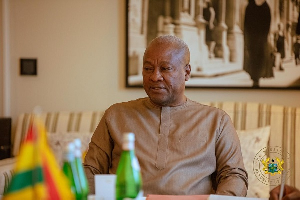First published in 2009. We are republishing it due to its relevance today
When President Mills’ term began in January, I told Sedem, my young, smart and really hard-working researcher that the national discourse for half the year would be dominated by Cars.
Sedem had been working in banking previously and had only covered his first election in 2008. I wish I had been wrong. I think this jostling over cars by our politicians is, frankly, pathetic.
My view is that the policy, dating back to the nineties, which allows ministers to buy off their official vehicles is wrong and should be scrapped. Whether the vehicle is 10 days or 10 years old, ministers should simply hand over the keys and walk away when leaving office.
Ministers don’t have an interest in the desk or the drapery or the litter bin in their office when they’re leaving; why should their cars be different? They must part with every item provided to facilitate their duties while in office because they won’t require them for the purpose anymore. What they need in their private lives, they must acquire privately. That’s what private citizens do. Ministers should have no more interest in official vehicles than George W. Bush has in Air Force One.
That’s not all. Ministers and their immediate family members should be excluded from participating in the auction of vehicles previously used by ministers that are written off by the departments with oversight for state assets.
You see, as a guest presenter at Joy FM, members of my family and I are excluded from participating in on-air competitions and sweepstakes organized by the station. Ordinarily, my family members at least, if not I, should be able to participate. But you need such a regulation to raise the ethical bar to prevent conflict of interest and, even more importantly, the perception of it.
I’m told that in the UK, your relationship with official assets and facilities cease the day your job ends as minister. Period.
Actually, we don’t need to travel too far to find a good example. The Heads of our diplomatic missions abroad don’t keep their cars after they leave their post. After serving for eight years as Ghana’s Ambassador in Sierra Leone and later in the Ivory Coast, Kabral Blay-Amihere is back home without the embassy’s Merc. The same must apply to ministers. Retiring teachers don’t yank the blackboard off the classroom walls and hobble off into pension, do they?
Politicians need to establish confidence and trust with the people. It’s the absence of these that creates the impression that their interpretation of public service is service from, rather than to, the public. I believe that the reality is largely, but not entirely, false. But it doesn’t help if you hang onto your official car or house for weeks after you’ve left office, or maneuver to acquire it on the cheap. It makes you cheap.
I appreciate the fact that the rules permit ex-Ministers to buy off their cars and some of these houses in fancy neighborhoods. But who made the rules? In my humble Akuapem Presbyterian view, it’s all very unethical, childish and embarrassing.
Curiously, many in the NDC who are today hooting at ex-NPP ministers have been beneficiaries of these pathetic regulations in the past. It’s enough now!
I hope that when President Mills and his ministers complete their term, they will not find the logic of the ex-NPP ministers suddenly appealing.
Opinions of Saturday, 11 February 2017
Columnist: sakyi-addo.com







![Former president Akufo-Addo [L] and Ken Ofiri-Atta Former president Akufo-Addo [L] and Ken Ofiri-Atta](https://cdn.ghanaweb.com/imagelib/pics/219/21967189.295.jpg)











